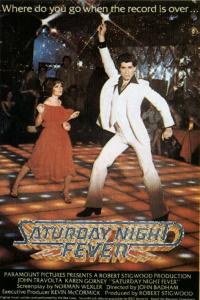 It's
the movie that made John Travolta (Grease,
Two of a Kind) a superstar, and a
quintessential film of the 1970s. Unfairly maligned by some, possibly
because of its association with one of the most reviled forms of popular music
ever created, Disco, this is actually a solid character study, full of gutsy
characters, interesting developments, and some of the most electric scenes of
dancing around. It also sports one of the most successful soundtracks
ever made, with some very memorable tunes by the Bee Gees in particular.
It exploded onto the scene and became an international sensation, only to burn
out just as quickly as the music within it, and somewhere along the line,
people forgot that there is actually a very good movie here.
It's
the movie that made John Travolta (Grease,
Two of a Kind) a superstar, and a
quintessential film of the 1970s. Unfairly maligned by some, possibly
because of its association with one of the most reviled forms of popular music
ever created, Disco, this is actually a solid character study, full of gutsy
characters, interesting developments, and some of the most electric scenes of
dancing around. It also sports one of the most successful soundtracks
ever made, with some very memorable tunes by the Bee Gees in particular.
It exploded onto the scene and became an international sensation, only to burn
out just as quickly as the music within it, and somewhere along the line,
people forgot that there is actually a very good movie here.
Travolta plays Tony Manero, a
19-year-old Brooklyn resident living with his parents and barely eking out
enough money to support his one true passion -- dancing at the local club
until the wee hours of the morning. Although he isn't anything special
by day, his parents thinking him a failure, working as a lowly assistant in a
paint store, but by evening, he's the king of the dance floor. He's the
envy of all of the men, and the dream conquest of the ladies, but all he wants
to do is be respected for his dancing, and maybe, get out of the lower class
existence that is holding him back. He finally spots a slice of the good
life when an older, more sophisticated woman catches his eye in the form of
another great dancer, Stephanie (Gorney). She sees Tony as a step back
for her socially, but he is persistent, and soon, the two become partners --
but only on the dance floor. Feelings often get in the way, and the two
have to come to grips with what is most important in life, where they want to
go, and who they want to be.
At the time of its release, disco was
actually seen to be on the decline. Primarily an underground scene, it
catapulted into a major mainstream phenomenon due to this film, and soon,
nearly every guy was out there on the dance floor in a white polyester suit
just like Travolta, putting on the same moves and hoping that they are good
enough to clear the floor so that everyone can watch them strut their stuff.
The reasons why the film's quality is
dwarfed by its success are many. One happens to be the monumental
success of the soundtrack, perhaps even more popular than the movie.
Hits like "Night Fever", "More Than a Woman", "You Should Be Dancing", "Stayin'
Alive", "Disco Inferno", "If I Can't Have You", "How Deep is Your Love", and
others became breakout hits, ruling the pop charts and making the soundtrack
one of the best-selling records of all-time, even to this day.
The film's biggest asset is Travolta
himself. Tony Manero could have very easily been an unlikable character,
unworthy of adulation or attention, but Travolta makes him very appealing.
Travolta literally spent months nailing down the moves and attitude of the
young Italian dance floor god, and he is so good, you really do believe he
could be the cream of the crop in the city of New York. Travolta would
get nominated for Best Actor for his dynamite performance.
Unfortunately, as is the case with
most phenomena that become massive pop culture fads, the burn out factor was
extreme here. Disco died as quickly as it came, the Bee Gees hold on the
pop charts was no more, and people became tired of seeing Travolta's face
anymore, leading him to struggle as an actor for over a decade in obscurity.
Sadly, when many people think about
Saturday Night Fever, they only think about some of the patented moves,
the songs, and the glitz of the discotheque. It's so hard to remember
that this is a story of a boy becoming a man, wanting desperately to make
something of himself and not knowing how, and how the art of dancing, even in
a setting as banal as the local club, can provide the escapism and
self-expression one needs to cope with all of the problems of the day.
As fun as the 1970s nostalgia may be, there are universal themes here that
resonate wonderfully, if only one is able to see and hear them under the
strobes, mirrors and thumping rhythms of the disco anthems.
Qwipster's rating:





©2005 Vince Leo

